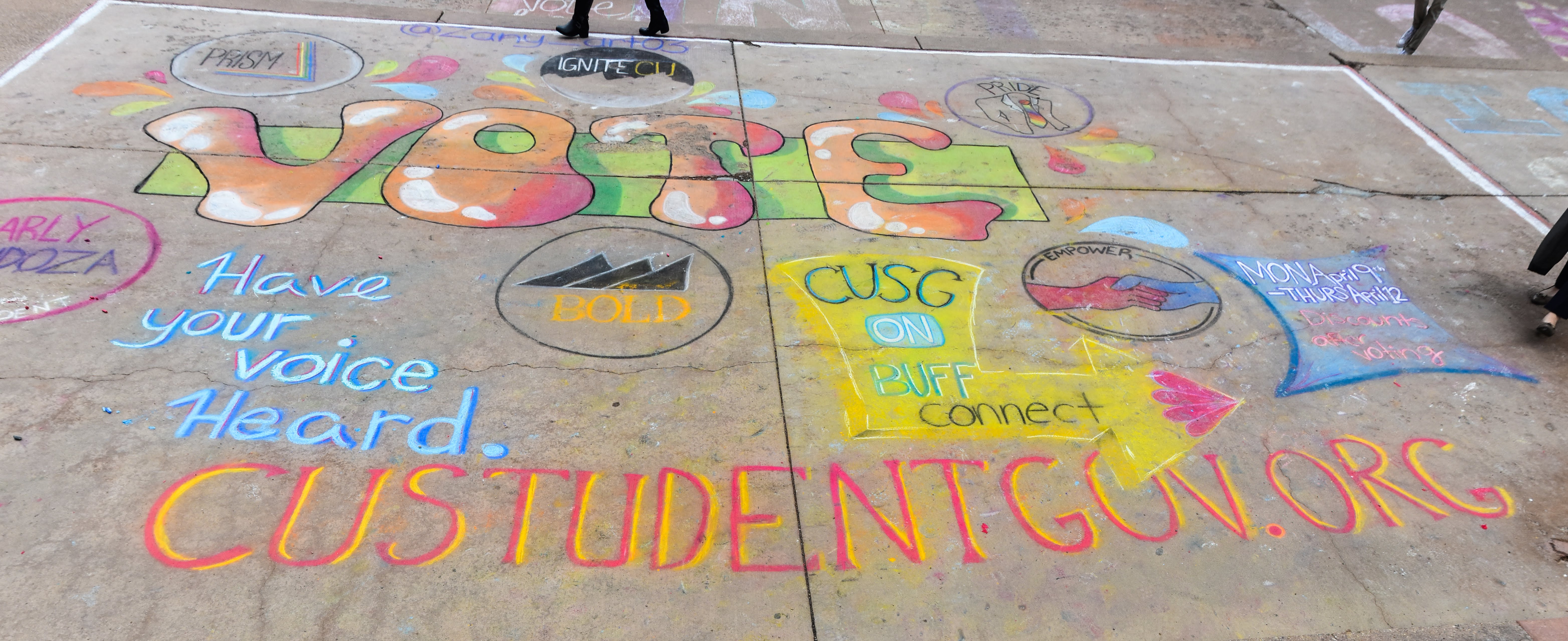
Chalk decorations in front of the UMC encouraging students to vote in the spring 2018 CUSG election. (Fiona Matson/CU Independent file)
The University of Colorado Student Government’s recent spring 2020 election saw the lowest voter turnout in 10 years with just under 3% of the student population voting. CUSG representatives have, in part, attributed the results to the disruption the global coronavirus pandemic has caused students and the campus as well as CUSG itself.
Due to social distancing guidelines and a lack of student presence on campus, all campaigns had to promote solely online, losing out on the chance to speak with students in-person. Normally, candidates are allowed to table on campus and promote their campaign as long as it does not infringe on equity, such as by buying votes or using monetary funds to promote their campaign.
“We see this election, like this current moment, as an extraordinary challenge that placed unprecedented concerns on CUSG officials,” said executives Michael Martin and Ryan Passas in a joint statement to the CU Independent. “We hope to use the lessons learned this year to further engage students in a variety of ways in future elections.”
In total, 851 students voted, a stark comparison to just two years ago, when spring 2018’s election saw a decade record turnout of 6,390 students or 20.5% of the student population at the time. Voting for that election began just days after CUSG faced a major autonomy threat when CU Boulder Chancellor Philip DiStefano said he planned to reduce its financial oversight by 90%. Following a protest on campus, DiStefano reversed his decision.
CUSG controls around $25 million in student fees, allocated to cost centers such as the University Memorial Center, Volunteer Resource Center and the Cultural Events Board.
All CUSG elections are held completely online through Buffportal and had previously been on MyCUinfo. All students are automatically enrolled to vote. Students can vote for multiple candidates each semester as there is no minimum or maximum. Spring elections are when tri-executives are chosen along with four representatives at-large. In the fall elections, five representatives at-large are chosen for a total of nine.
While student governments for both Colorado State University and Metropolitan State University in Denver delayed or postponed elections due to the uncertainty caused by the spread of COVID-19, CUSG representatives said doing so was not an option for them.
“It goes without question that low turnout in CUSG elections is disappointing. However, now more than ever is student leadership necessary to ensure a functional and resilient campus climate. Election times are constitutionally mandated and to postpone or cancel elections would jeopardize CUSG’s legitimacy,” Martin and Passas’ statement reads.
The pandemic also forced CUSG to change the way it does many of its meetings and day-to-day workings. All meetings are now held online and major events have been canceled. Clubs have been limited to spending only on essential needs to keep going.
CUSG took steps to inform students of the election by emailing hundreds of students, professors and faculty members. The CUI also published its semesterly voter guide.
With the spring’s election bringing in a low number of votes, the constitutional amendment on the ballot did not pass. Passing an amendment requires at least 10% of the student population to vote. The amendment would have changed the constitution’s wording, removed some jargon and created clarity so that students can better understand it. It also would have changed how some officials are elected to streamline the process.
Contact CU Independent Senior News Editor Tory Lysik at tory.lysik@colorado.edu.
